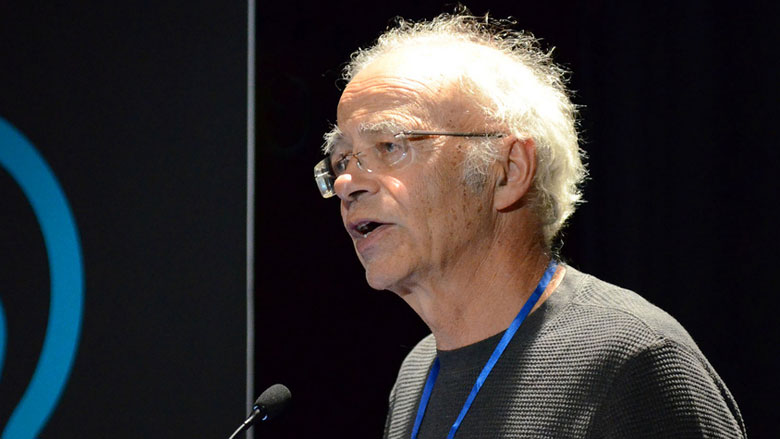Should Christians wish Peter Singer a happy birthday?
By Charles C. Camosy | July 7, 2016, 6:14 EDT
 (Courtesy of Flickr)
(Courtesy of Flickr) (RNS) — Peter Singer, Princeton philosopher and provocateur, turned 70 years old Wednesday (July 6).
It’s the kind of milestone that leads many, many writers to take stock of his impact on the world.
It would be difficult to imagine a more consequential life than Singer’s. He has not only become the world’s most influential philosopher; he has became one of the world’s most influential people, period.
He may have single-handedly made ethical concern for animals the mainstream issue it has become today, saving billions from torture and death. He has also worked tirelessly to address issues such as global poverty and climate change, helping hundreds of thousands radically change how they consume resources.
As an academic bioethicist, I know a serious conversation about abortion and euthanasia is incomplete without addressing “Singerian” positions that attack the sanctity of human life.
Many traditional Christians never get beyond Singer’s insistence that being a person requires going beyond being a Homo sapiens organism and actually displaying rationality and self-awareness. Singer’s exclusion of prenatal children, newborn children and even the severely disabled from the community of persons means such Christians refuse to take him seriously.
I, too, find these views horrific and disturbing. But they aren’t qualitatively different from the horrific and disturbing views of million and millions of others. Singer only takes the views of average supporters of abortion rights and euthanasia and follows them to their logical conclusion.
There are, in fact, numerous reasons traditional Christians should carefully and prayerfully engage Singer’s work with an open mind. Here are three:
1. Singer should be a pro-lifer’s best friend.
His views on abortion are actually a powerful tool for those who oppose abortion. When I engage someone with whom I disagree, I most often find a way to ask them “Why is Peter Singer wrong?”
Like millions of abortion rights supporters who believe a fetus is not a person, despite being a living Homo sapiens organism, Singer reasons consistently and concludes that the postnatal child is not a person, either. Neither prenatal nor postnatal babies are self-aware or rational. Neither kind of child cares about his or her life.
Singer is merely following standard abortion rights reasoning and applying it to infanticide. When faced with the prospect of the legal killing of newborns, at least in my experience, many supporters of abortion rights can change their mind. It becomes clear that one simply cannot paper over the taking of a human life with euphemisms like “choice” and “privacy.” Singer’s views force this group to be more intellectually honest about what it is that it supports.
2. Singer pushes Christians to care for nonhuman animals.
Though it has a “liberal” reputation in U.S. politics, it would be difficult to find a more traditionally Christian view than care for creation. Indeed, before the incoherent confusion wrought by our lazy culture wars, the idea of “conserving” the land and its many creatures would have been considered, well, a conservative position.
Indeed, it was Singer’s work that not only pushed me to resist structures of sin that lead to torture and killing of billions of nonhuman animals, but also to look for resources on this topic within Christian tradition. What I found, much to my surprise, was that theologians advocating for animal protection use some of the most traditional ideas found in Scripture and tradition when making their case.
3. Singer reminds traditional Christians of our radical duties to the poor.
Singer’s first article, which claimed our refusal to aid the poor meant that we were morally responsible for their deaths, should be assigned in thousands of college ethics classrooms all over the world. An unabashed poverty activist, Singer has even set up an “impact calculator” to help determine where our charitable giving might have the most effect. Singer argues that our responsibility to the poor is so strong that it is a moral duty to give away most of our wealth.
When I first read Singer’s work on poverty, I was shocked by its resonances with the teachings of Jesus, the church fathers, Thomas Aquinas and Catholic social doctrine. Those who hoard their money are morally responsible for the deaths of those they could have helped. (Catholic teaching refers to this as “indirect homicide.”)
Wealth exists to be shared. The poor who steal from the rich for basic needs do not commit theft, because they only take what was rightfully theirs in the first place. Following Jesus means selling your possessions and giving them to the poor. If only most Christians took these principles as seriously as Singer takes his.
Dismissing Singer’s work as unworthy of engagement is a mistake. Happily, the last few years have seen Christian ethicists engaging Singer as a serious conversation partner. The result has been fruitful and mutually critical interactions that have forced both sides to sharpen their point of view on how best to support the vulnerable.
So in light of this, yes, happy 70th birthday to Peter Singer.

Charles C. Camosy
Charles C. Camosy teaches bioethics at Fordham University. Follow him on Twitter @nohiddenmagenta. Read his past columns here.
COPYRIGHT 2016 ReligionNewsService.org











